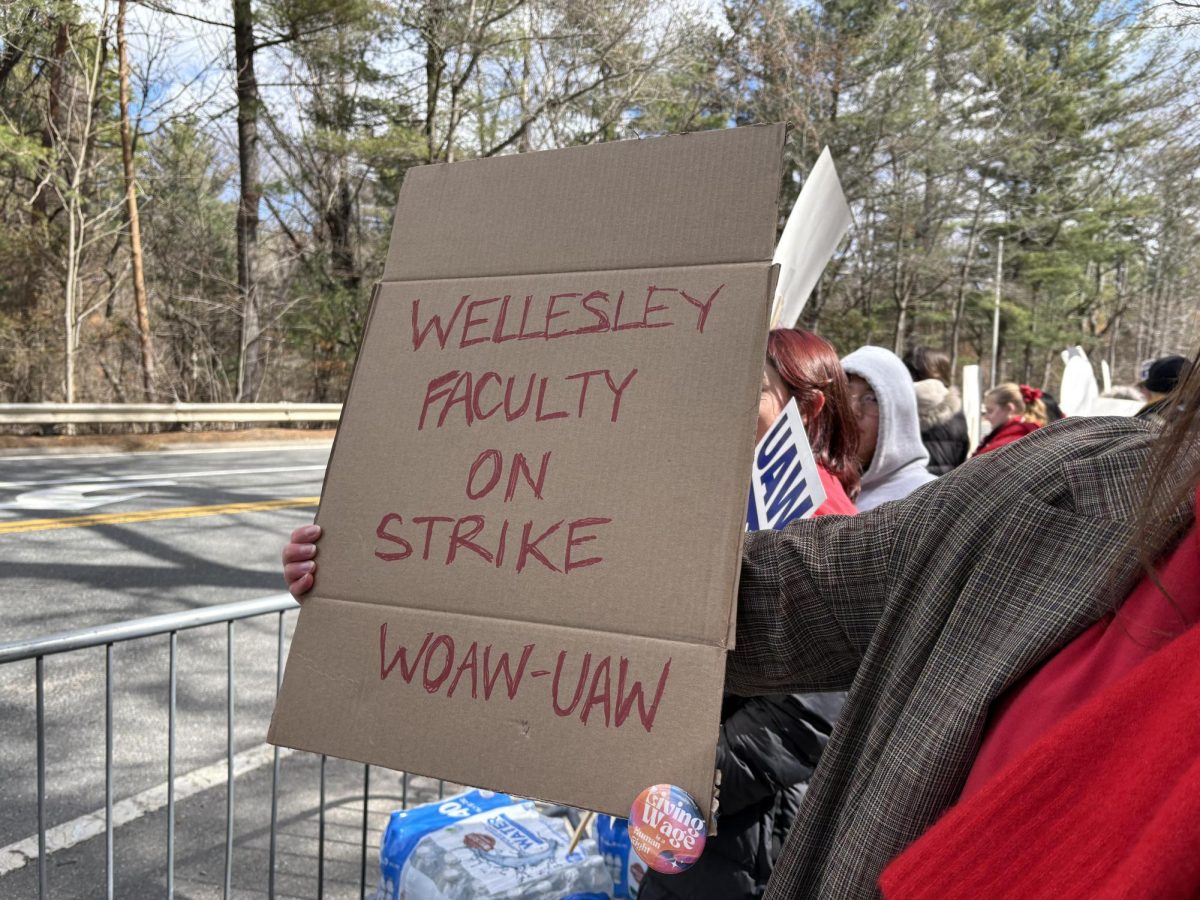On Nov. 16, the Wellesley Organized Academic Workers (WOAW), Faculty on Term Appointments, Instructors of Science Labs, Physical Education, Recreation and Athletics (FIP) faculty announced their new union through Instagram.
“No longer defined by what we are not, we are proud to call ourselves the WOAW faculty – the Wellesley Organized Academic Workers,” they wrote, in an open letter to the Wellesley College community.
The statement detailed the demands of the FIPs regarding their salaries and benefits as non-tenure track faculty, specifically noting that there have been only incremental changes to FIP faculty salaries, including the 9% raise in 2019, and the salary bump in 2022. From 2008 to 2020, the starting salaries for FIP faculty were frozen after the economic recession at $55,000. According to Professor Brubaker, Senior Lecturer in the Writing Program, the catalyst for organizing the union was the demand for salary benchmarking, which is to make the starting salary at Wellesley for FIP faculty members comparable to colleges and universities in the area, so that FIP faculty can have a livable wage.
“[The benchmarking] was something that we worked with the Budget Advisory committee to develop a proposal that would allow for us FIPs to have a benchmarking system just like staff and tenure-track faculty have,” she said. “We put together a report, and several of us met with Provost Andy Shennan, and that really didn’t go anywhere. We never got a follow-up from them. We pulled all the levers we could pull with the existing governance structure that we had.”
The starting salary at Wellesley College for Visiting Lecturers and ISLs, who are classified as FIP faculty, is $63,500 , which is 42% less than the starting salaries for Assistant Professors. After becoming a Lecturer, Professor Heather Bryant did not get a raise but did get a course reduction. In order to make a livable wage, she had to take course overloads in order to make a livable wage, which when she started were $7,500 per course. But after Wellesley for the Abolition of Militarism and Incarceration (WAMI) Union and Labor Advocacy task force (UniLAD) organized a teach-in in Spring 2022, and created more awareness about non tenure track faculty’s compensation issues, the overload pay was changed to $10,000.
After her subsequent promotion to a Senior Lecturer in the Writing Program in 2021, Prof. Bryant got a raise of $5,000. Bryant has taught four or five classes every year, sometimes along with two courses in the summer. For her, one of the major issues for FIP faculty is the lack of stability, not only with their contracts but also in their wages for overload.
“Our salaries are essentially kind of chaotic. It’s just what they think they can get away with,” Bryant said. “They always point to the bad job market, and say that there’s crowds of people flocking to get these jobs, so we should be happy to have them.”
The low salaries also weigh heavily on short-term contract faculty who struggle to attain job security at colleges and universities. Visiting Lecturer in American Studies, Ian Alexander, spoke about the workload that makes it difficult for new faculty to break into academia.
“Something that is happening in the U.S. across colleges and universities is the increasing casualisation of academic labor, and the increasing precarity of more workers within colleges and universities are facing similar challenges, but very specifically, for contingent faculty, for people who are on short-term contracts like myself, or renewable contracts, or people who are teaching in labs, or postdocs,” Alexander said. “It’s very difficult to establish job security and to find space to be able to grow as a researcher, while also satisfying all of the requirements of teaching, and what is usually a heavier teaching load than our tenure counterparts. We’re often forced to negotiate and bargain individually and to not really know the kind of latitude we have to bargain.”
Discussion about forming a union began in the summer as FIP faculty reached a point where they felt that administration was not listening to their demands. After FIP faculty discussed among themselves, they began speaking to union representatives that worked with academic workers in the area. The faculty decided to join the United Auto Workers (UAW) union, which has more than 100,000 academic workers as members.
Hannah Grimmett ’25, who is involved in UniLAD, WAMI’s union and labor task force, has been advocating for the formation of a union for the past two years, as she believed non-tenure track faculty would not make any major gains without forming a union, which organized the non-tenure track faculty teach-in in spring 2022 that she credited with increasing the awareness of the challenges non-tenure track faculty face.
Grimmett has experience working with labor organizations, specifically the Kansas National Education Association and Workers United of Upstate New York, and emphasized the importance of academic workers unionizing, especially at Wellesley. While not working as part of UniLAD with WOAW, she spent a significant amount of time advocating for the creation of a union for FIP faculty, considering that the administration seemed resistant to their demands. For her, one of the major issues was specific contract language, specifically language regarding “just cause,” which refers to concrete, defined rules regarding disciplinary action or terminations.
“As we are all familiar with, non-tenure track faculty can be fired at will, which is insane, because they go to school for nearly a decade to get a PhD and they can be fired at will,” she said.
“In particular, [sociology professor] Matt Kaliner being terminated without cause very much inspired me to really push just cause [as a focus of the union’s demands].”
Each of the interviewees pointed to the lack of transparency from the College administration as a major obstacle to creating awareness around the issues FIP faculty face on campus. Brubaker specifically noted that there are no specific numbers provided regarding just how many FIP faculty there are.
“It’s in their best interest in some ways to not signal how many of us there are… They want to promote an image of a residential college that has award-winning faculty who are committed to their research, but also to students,” she said. “The picture of that may change if confronted with the reality that there’s many more people who are moving in and out of the community as faculty.”
The lack of transparency from the College pushed the union to understand the employment status of faculty at Wellesley. Senior Lecturer in the Writing Program, Erin Battat, shared that 40% of Wellesley’s faculty is non-tenure track faculty.
“The other thing that really matters is that non-tenure track labor, the whole system, our titles, the way we’re paid, and the culture relies on the assumption that we are temporary and replaceable. That we’re not real faculty,” Battat said. “The truth is that Wellesley actually relies heavily in order to function, in order to run its academic programs. We are vital to the operation of most of the departments. We are vital to the first-year experience.”
Grimmett also noted specifically that the devaluing of the teaching and mentorship that non-tenure track faculty provide by the administration impacts students on a day-to-day basis.
“The union has put out a lot of information on the devaluing of teaching and mentorship roles, and greater value put on research, which tenure track faculty do more of, “ she said. “Research is what people on the outside see, but mentorship and teaching is what we students experience in our day-to-day lives, and the administration clearly values one more than the other.”
On Dec. 11, the College Government Cabinet released a statement of solidarity with the WOAW-UAW union, encouraging students and alums to show their support by signing the letter from the FIP union outlining their reasons for forming a union.
“We encourage the College to recognize the union, to issue a statement of neutrality, and to set fair terms for the NLRB election. FIP faculty are valued members of our campus community. We firmly believe that unionizing all FIPs at Wellesley will lead to a better environment for all and that students’ learning conditions will improve when faculty’s teaching conditions improve,” the statement read.
On Dec. 12, the union held an event in the Science Center innovation hub titled “Sip N’ Solidarity.” The event was an opportunity for the College community to learn more about the intentions of the union, and to hear updates from members about their path to achieve their goals.
“The best thing we can do is to provide security for people who are not going to access this old model of security, which is through tenure,” Alexander said. “Finding ways for faculty to build a life and not have to wonder if they’re going to have to pick up and move, or reapply for their jobs every two to three years and have to face a job market that wants research when they’ve been doing so much teaching that they haven’t kept up with research.”







